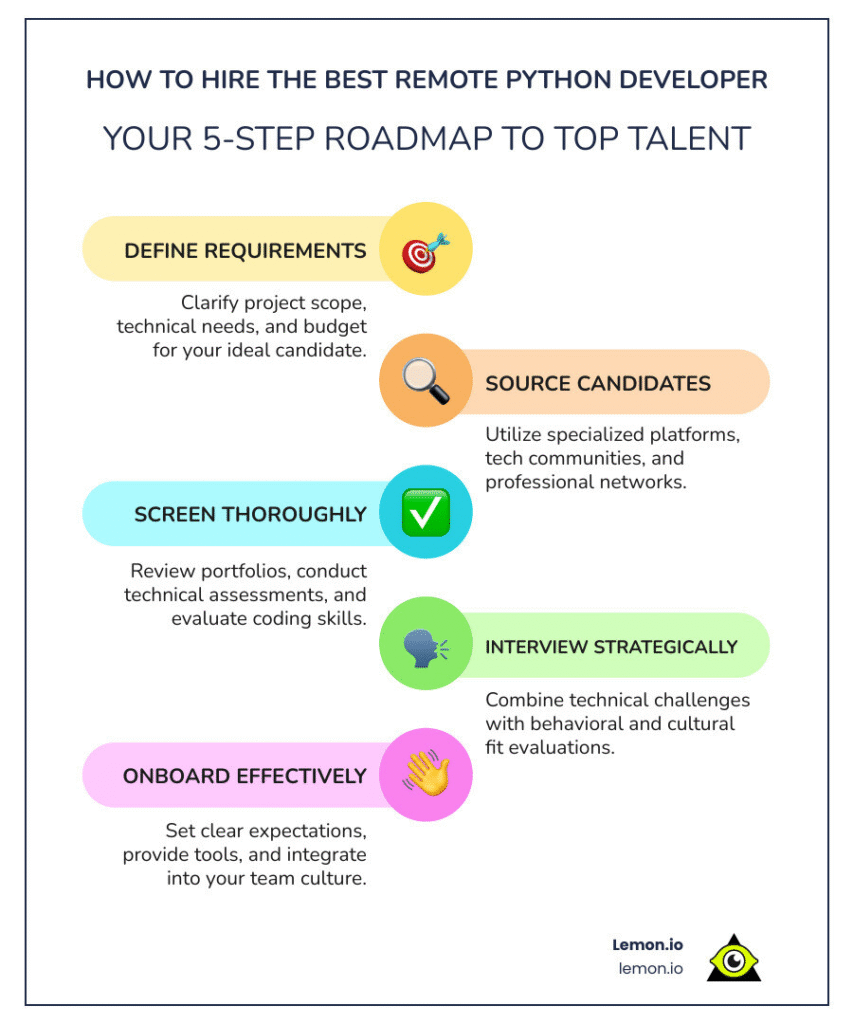How to hire the best remote python developer starts with understanding why this combination is so powerful. Here’s a 5-step process:
- Define requirements: Clarify project scope, technical needs, and budget.
- Source candidates: Use specialized platforms and communities.
- Screen thoroughly: Review portfolios and conduct technical assessments.
- Interview strategically: Combine technical challenges with cultural fit evaluation.
- Onboard effectively: Set clear expectations and integrate into your team.
Python is the third most in-demand programming language for a reason. Its versatility across web development, data science, AI/ML, and automation makes Python developers valuable for fast-moving teams.
The remote hiring advantage is just as strong. You gain access to a global talent pool of 15.7 million Python developers, often at 30-70% cost savings compared to local hiring, without sacrificing quality. It’s about finding the right developer for your needs, regardless of geography.
I’m Aleksandr Volodarsky, and I’ve helped scale Lemon.io from $2.7M to $10M by perfecting our approach to hiring remote Python developers. My experience shows the key is understanding both technical needs and the human elements of successful remote collaboration.

Step 1: Defining Your Ideal Candidate and Project Scope
Before you start hiring, you need a blueprint. How to hire the best remote python developer begins with defining your specific needs. Python’s versatility means developers often specialize. Are you building a web app (Django/Flask), diving into data analysis (Pandas/NumPy), or automating tasks?
Your technical stack is crucial. List every framework, database, and tool to find a developer who can contribute from day one.
Next, plan your budget. Remote hiring offers significant advantages here. While US Python developers earn $73,287-$191,606 annually, hiring globally can lead to up to 59% cost savings without sacrificing quality.
Finally, choose your engagement model: full-time for long-term needs, project-based for specific endpoints, or part-time to scale gradually.
Defining the Role: Your First Step in How to Hire the Best Remote Python Developer
A Python developer is a digital problem-solver who turns business needs into software. Their responsibilities vary but often include:
- Server-side development: Crafting the backend logic that powers your application, handling data, and ensuring scalability.
- Database integration: Designing how your application stores and retrieves data from databases like PostgreSQL or MongoDB, ensuring efficiency and security.
- API development: Building the connections that allow your application to communicate with other services, payment processors, or internal microservices.
- Security implementation: Implementing authentication, data encryption, and compliance with regulations like GDPR.
- Collaboration: Working closely with front-end teams and designers to create a cohesive user experience.
- Bug fixing and testing: Writing reliable code, implementing testing strategies, and ensuring the application remains stable as it evolves.
Essential Technical Skills for a Top-Tier Python Developer
Technical skills indicate what a developer can accomplish. Prioritize skills based on your project’s complexity and team’s experience.
Skill Area |
Junior Python Developer |
Mid-Level Python Developer |
Senior Python Developer |
|---|---|---|---|
Core Python Proficiency |
– Comfortable with Python 3.x syntax, basic data types, and control flow. |
– Solid understanding of Python 3.x, OOP concepts (classes, inheritance, polymorphism). |
– Expert in Python 3.x, advanced OOP, design patterns, metaprogramming. – Deep knowledge of data structures and algorithms, performance optimization. – Familiarity with profiling tools (cProfile, timeit). |
Web Frameworks |
– Basic familiarity with a web framework (e.g., Flask basics or Django’s MTV pattern). |
– Proficient in one or more frameworks (Django, Flask, FastAPI). |
– Expert in multiple frameworks, capable of designing scalable web architectures. |
Data Science & ML |
– Basic use of NumPy and Pandas for data manipulation. |
– Can perform data analysis and visualization with Pandas, NumPy, Matplotlib, Seaborn. |
– Proficient in ML frameworks (TensorFlow, PyTorch, scikit-learn). |
Databases |
– Basic SQL queries (e.g., MySQL or PostgreSQL). |
– Good understanding of SQL/NoSQL databases (MongoDB). – Experience with ORM (e.g., SQLAlchemy). |
– Expert in database design, optimization, and scaling. |
DevOps & Version Control |
– Familiarity with Git (basic commands: commit, push, pull). |
– Proficient with Git/GitHub/GitLab (branching, merging, conflict resolution). |
– Expert in Git workflows, CI/CD pipelines, and cloud platforms (AWS, Google Cloud, Azure). – Experience with Docker, Kubernetes, Terraform, Ansible. |
Package Management |
– Knows how to use pip to install packages. |
– Comfortable with pip, conda, and virtual environments (virtualenv). |
– Expert in dependency management with Poetry. |
Other |
– Basic debugging skills. |
– Can write unit tests and understands TDD. |
– Strong focus on secure coding, code quality, and maintainability. – Mentorship abilities. |
- Core Python proficiency: Mastery of Python 3.x, Object-Oriented Programming (OOP), data structures, and algorithms is fundamental for writing efficient code.
- Web framework expertise: Choose based on your project. Django is great for complex apps, Flask for simpler projects, and FastAPI for high-performance APIs.
- Data science and ML libraries: For data-driven projects, look for skills in NumPy, Pandas, TensorFlow, or PyTorch.
- Database knowledge: Skills in SQL (PostgreSQL) or NoSQL (MongoDB) are crucial. Experience with ORM tools like SQLAlchemy is a plus.
- DevOps and version control: Proficiency with Git, GitHub/GitLab, Docker, and cloud platforms (AWS, Google Cloud, Azure) is essential for modern workflows.
- Package management: Expertise with pip, conda, and virtual environments prevents dependency issues.
Crucial Soft Skills for Remote Collaboration
Technical skills get the job done, but soft skills make remote collaboration successful. Look for:
- Communication: Excellence in written and verbal communication is key. Proficiency with asynchronous tools like Loom and Notion is a huge plus.
- Problem-solving independence: The ability to tackle challenges autonomously while knowing when to ask for help.
- Time management and self-discipline: A remote developer must manage their own schedule and maintain productivity without direct supervision.
- Adaptability: The flexibility to adjust to new tools, evolving requirements, and the challenges of distributed work.
- Teamwork: Effective collaboration using tools like Jira and Slack to contribute positively to team dynamics.
- Cultural fit: Alignment with your company’s values, work style, and culture, even from a distance.
Step 2: The Step-by-Step Process of How to Hire the Best Remote Python Developer
With your ideal candidate defined, it’s time to find them. This requires knowing where to look, how to screen effectively, and how to conduct interviews that reveal both technical skill and remote readiness.

The process is about actively hunting for talent where the best developers congregate, screening for genuine expertise, and using interviews to understand the person behind the code.
Where to Find and Source Remote Python Talent
Top Python developers are often active in the community, not just on general job boards. How to hire the best remote python developer means looking in the right places:
- Specialized Python communities: The Python.org job board is a great starting point. Stack Overflow also reveals developers who are actively solving complex problems.
- GitHub: A developer’s GitHub profile is a window into their abilities. Look for active contributions, clean code, and personal projects. Python’s popularity in open-source makes it easy to spot talent here.
- Tech communities and forums: Places like Reddit’s r/Python, Discord servers, and Slack communities offer direct access to engaged developers.
- Niche job boards: Sites like PyCoder’s Jobs, Django Jobs Board, and Remote Python attract developers specifically looking for Python roles.
Remote hiring provides access to global talent pools, allowing you to find high-quality developers in regions with favorable cost structures. Specialized platforms can connect you with pre-vetted international talent, saving you time.
Screening and Shortlisting Candidates
Once applications arrive, quickly identify the most promising candidates by looking for genuine expertise and remote work potential.
- Resume analysis: Go beyond keywords. Look for clear project descriptions with quantifiable achievements, like “improved API response time by 40%.”
- Portfolio deep-dives: Examine GitHub repositories for code quality, documentation, and project diversity. Clean code and open-source contributions are great signs.
- Code samples: These provide concrete evidence of problem-solving skills. Look for neat solutions, error handling, and adherence to Python best practices.
- Automated skills testing: Use platforms like HackerRank or CodeSignal for an objective baseline of a candidate’s coding ability.
Throughout this process, look for signs of remote work readiness, such as clear written communication and experience with self-directed project management.
The Interview Gauntlet: A Crucial Stage in How to Hire the Best Remote Python Developer
The interview process should reveal how candidates think and work. It must be thorough but respectful of their time.
- Initial screening call (15-30 min): Assess communication skills, confirm experience alignment, and gauge enthusiasm.
- Technical interviews: Dive deep into Python knowledge, framework experience, and problem-solving approaches. The goal is to understand their depth, not to stump them.
- Live coding sessions: Use platforms like CoderPad to present a relevant problem. Observing their real-time process reveals problem-solving skills, debugging ability, and how they handle pressure.
- Pair programming sessions: Simulate remote collaboration by working on a problem together. This provides insight into their communication and teamwork style.
- System design discussions (for senior roles): Evaluate architectural thinking by discussing how they would design scalable applications or structure microservices.
- Behavioral interviews: Focus on remote work success factors like asynchronous communication, time management, and handling challenges to assess cultural fit.
The process should be collaborative, not confrontational. You are evaluating them, but they are also evaluating you.
Step 3: Finalizing the Hire and Ensuring a Smooth Onboarding
Congratulations! You’ve found your Python gem. Now it’s time to make it official and welcome them to the team. This final step in how to hire the best remote python developer is crucial.
The key is creating clarity from day one while showing your new developer you’re excited to have them aboard.
Crafting the Perfect Contract and Offer
A solid contract is a roadmap for a successful partnership, especially with remote talent where clear expectations are critical.
- Scope of work and deliverables: Be specific. Instead of “build cool stuff,” outline the exact features, quality standards, and components they will work on.
- Timelines and milestones: Break the project into smaller chunks with clear deadlines to track progress and manage different time zones.
- Payment terms: Be transparent about rates, payment schedules, and invoicing. Remote hiring allows access to global talent at competitive rates—for example, developers in Eastern Europe or Latin America may cost 30-50% less than their US counterparts (who average $118,500 annually) without a drop in quality.
- Confidentiality and IP rights: Include a strong NDA and clearly define ownership of the code created.
- Termination clause: Outline clear terms for ending the engagement, including notice periods and handover requirements.
Onboarding and Integrating Your New Remote Developer
Great onboarding turns a new hire into a productive team member and sets the tone for your working relationship.

- Set up tools and access beforehand: Grant access to Slack, Jira, Git repositories, and all necessary development environments before day one.
- Assign a mentor: Pair them with an experienced team member to answer questions about the codebase, culture, and technical challenges.
- Choose first-week tasks wisely: Start with a meaningful but manageable task, like a small bug fix or documentation improvement, to help them get familiar with the codebase.
- Schedule regular check-ins: Use daily stand-ups initially, then transition to a regular cadence to provide feedback and keep them connected.
- Foster team culture: Intentionally include new hires in virtual coffee chats, team retrospectives, and brainstorming sessions.
- Introduce code reviews and standards: Share your Python coding standards and review process early. Use tools like Pylint or SonarQube to maintain consistency.
- Invest in continuous learning: Support their growth by budgeting for conferences like PyCon or online learning subscriptions.
Successful onboarding builds a foundation for a long-term partnership, turning a hire into a valuable team member.
Frequently Asked Questions about Hiring Remote Python Developers
Let’s tackle the most common questions about how to hire the best remote Python developer.
What are the primary responsibilities of a remote Python developer?
A remote Python developer is a versatile problem-solver. Their primary responsibilities typically include:
- Server-side development: Writing and maintaining the backend code that powers your applications.
- Database integration: Designing and managing how data is stored and retrieved from databases like PostgreSQL or MongoDB.
- API development: Building the connections that allow different systems and services to communicate.
- Collaboration: Working with front-end developers, designers, and product managers to build cohesive products.
- Maintenance: Debugging code, optimizing performance, and implementing security measures.
Depending on your project, they might specialize in web development (Django, Flask), data science (Pandas, NumPy), or machine learning (TensorFlow).
How do you assess the technical skills of a remote candidate?
Use a multi-faceted approach to assess technical skills, as no single method is foolproof.
- Review their GitHub profile: It’s a portfolio of their actual code. Look for clean, well-documented projects and open-source contributions.
- Use automated skills tests: Platforms like HackerRank or Adaface provide an objective baseline of their coding abilities in about 40 minutes.
- Conduct a live coding session: Use a tool like CoderPad to see how they solve problems in real-time. This reveals their thought process, communication skills, and ability to handle pressure.
- Ask technical deep-dive questions: Discuss Python fundamentals, framework experience, and past challenges. For senior roles, add system design questions to evaluate architectural thinking.
The goal is to understand how they approach problems and collaborate, not to ask trick questions.
How much does it cost to hire a remote Python developer?
Costs vary dramatically, but remote hiring offers significant flexibility and savings. Key factors include:
- Experience Level: This is the biggest cost driver. A junior developer might cost $30k-$60k annually, while a senior can command $100k-$150k+.
- Geographic Location: This is your secret weapon for cost optimization. A developer in a major US tech hub might earn $118,500+, but equally talented developers in other regions can be hired for 30-70% less. For comparison, UK rates range from £35,000 to £75,000.
- Specialization: A developer specializing in high-demand fields like AI/ML will command a premium over one focused on basic web development.
- Engagement Model: Full-time, project-based, and contract-to-hire models offer different levels of commitment and cost.
Remote hiring lets you balance skills, experience, and budget. At Lemon.io, we help companies connect with top-tier talent while achieving significant savings.
Conclusion: Build Your Dream Team with the Right Partner
Finding how to hire the best remote python developer is a strategic process, not a search for a needle in a haystack. This guide has provided a clear path: define your role, source and screen candidates intelligently, conduct insightful interviews, and onboard effectively.
The key is balancing technical expertise with the soft skills crucial for remote collaboration, like communication and self-discipline. Following this blueprint helps you build a high-performing team that leverages Python’s versatility to drive your projects forward.
However, this process requires significant time and expertise. That’s where a partner can make all the difference.
At Lemon.io, we’ve perfected this process. Our 100% manual vetting ensures every developer in our network has passed rigorous technical and soft skills assessments. We provide fast matching and month-to-month flexibility, allowing you to scale your team as needed.
Ready to skip the search and connect with the top 1% of talent? Let us help you hire vetted Python developers so you can focus on building amazing products.









